Bobwhite Habitat Action Continues with New Quail Forever Chapter in Pensacola
Quail Forever 08.08.14

Panhandle Quail Forever chapter to focus on Blackwater WMA and youth programs
Action supporting northern bobwhite quail populations and youth conservation education programs in Florida continues with a new Quail Forever chapter based in Pensacola. The new chapter is located in the eastern Panhandle and covers Escambia, Santa Rosa and Okaloosa counties. Officially known as the Panhandle Quail Forever chapter, the group becomes the seventh active Quail Forever chapter in the state.
The new chapter follows approximately three months after the creation of the Florida/Georgia Quail Coalition—a new partnership between Quail Forever, the Florida Fish and Wildlife Conservation Commission, the Georgia Department of Natural Resources-Wildlife Resources Division, and Tall Timbers Research Station & Land Conservancy to develop quality habitat for northern bobwhite quail and to support youth shooting programs. The chapter will provide support to the Quail Coalition and benefit outdoor enthusiasts, hunters, community youth, and local wildlife alike.
“The chapter’s primary goal is to support upland habitat improvement on public lands, specifically the Blackwater Wildlife Management Area, a quail focal area, through the Florida/Georgia Quail Coalition,” says Talbott Parten, Quail Forever’s regional representative for Florida and Georgia. “Secondary goals, but also important, are supporting local shooting teams through donations to their MidwayUSA shooting accounts, as well as introducing community youth to firearm safety, hunting, and the outdoors through Quail Forever’s No Child Left Indoors® initiative.” Quail Forever and the MidwayUSA Foundation have partnered to support youth shooting sports teams by establishing scholastic shooting trusts.
Quail Forever is dedicated to the conservation of quail, pheasants, and other wildlife through habitat improvements, public awareness, education, and land management policies and programs. Quail Forever chapters promote local, state, and federal conservation programs, which help landowners protect environmentally sensitive acres for quail and other wildlife. Quail Forever also employs a unique model of empowering local chapters with 100 percent control of the chapters’ locally-raised funds to complete habitat and youth education projects in the chapters’ own communities.
Panhandle Quail Forever Chapter
- The Panhandle Quail Forever chapter has elected James Fink of Pensacola as president, Cleveland Rhoades, Jr. of Cantonment as treasurer, Robert Howard of Cantonment as youth/education chair, Ron Taylor of Milton as habitat chair, and Monica Howard of Cantonment as banquet chair.
- For more information about the chapter, including upcoming meeting dates, contact chapter president, James Fink, at (850) 791-4437 / email or chapter treasurer, Cleveland Rhoades, Jr., at (850) 206-2576 / email.
- The Panhandle Quail Forever chapter is located near the Florida/Alabama boarder, so potential Alabama members are also encouraged to get involved.
Quail Forever in Florida
There are seven Quail Forever chapters in Florida. For more information about Quail Forever in Florida, to join a chapter or inquire about starting a chapter, contact Talbott Parten at (229) 289-8199 / email.
Contacts:
Anthony Hauck (651) 209-4972

